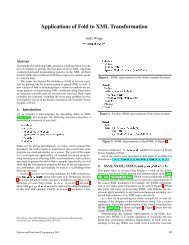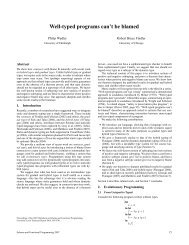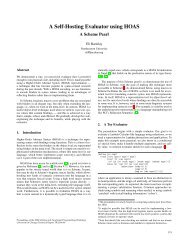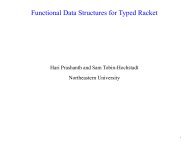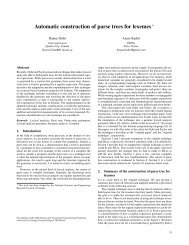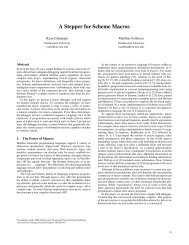2006 Scheme and Functional Programming Papers, University of
2006 Scheme and Functional Programming Papers, University of
2006 Scheme and Functional Programming Papers, University of
You also want an ePaper? Increase the reach of your titles
YUMPU automatically turns print PDFs into web optimized ePapers that Google loves.
(define interp<br />
(λ (env e)<br />
(case e<br />
[(Var ,x) (cdr (assq x env))]<br />
[(Int ,n) n]<br />
[(App ,f ,arg) (apply (interp env f) (interp env arg))]<br />
[(Lam ,x ,e) (list x e env)]<br />
[(Succ ,e) (succ (interp env e))])))<br />
(define apply<br />
(λ (f arg)<br />
(case f<br />
[(,x ,body ,env)<br />
(interp (cons (cons x arg) env) body)]<br />
[,other (error ”in application, expected a closure”)])))<br />
(type expr (datatype (Var ,symbol)<br />
(Int ,int)<br />
(App ,expr ,expr)<br />
(Lam ,symbol ,expr)<br />
(Succ ,expr)))<br />
(type envty (list<strong>of</strong> (pair symbol ?)))<br />
(define interp<br />
(λ ((env : envty) (e : expr))<br />
(case e<br />
[(Var ,x) (cdr (assq x env))]<br />
[(Int ,n) n]<br />
[(App ,f ,arg) (apply (interp env f) (interp env arg))]<br />
[(Lam ,x ,e) (list x e env)]<br />
[(Succ ,e) (succ (interp env e))])))<br />
(define apply<br />
(λ (f arg)<br />
(case f<br />
[(,x ,body ,env)<br />
(interp (cons (cons x arg) env) body)]<br />
[,other (error ”in application, expected a closure”)])))<br />
Figure 1. An example <strong>of</strong> gradual typing: an interpreter with varying amounts <strong>of</strong> type annotations.<br />
notated terms, is equivalent to that <strong>of</strong> the simply-typed lambda calculus<br />
(Theorem 1). This property ensures that for fully-annotated<br />
programs all type errors are caught at compile-time. Our type system<br />
is the first gradual type system for structural types to have this<br />
property. To show that our approach to gradual typing is suitable<br />
for imperative languages, we extend λ ? → with ML-style references<br />
<strong>and</strong> assignment (Section 4).<br />
We define the run-time semantics <strong>of</strong> λ ? → via a translation to a<br />
simply-typed calculus with explicit casts, λ 〈τ〉<br />
→ , for which we define<br />
a call-by-value operational semantics (Section 5). When applied<br />
to fully-annotated terms, the translation does not insert casts<br />
(Lemma 4), so the semantics exactly matches that <strong>of</strong> the simplytyped<br />
λ-calculus. The translation preserves typing (Lemma 3) <strong>and</strong><br />
is type safe (Lemma 8), <strong>and</strong> therefore λ ? → is type safe: if evaluation<br />
terminates, the result is either a value <strong>of</strong> the expected type<br />
or a cast error, but never a type error (Theorem 2).<br />
On the way to proving type safety, we prove Lemma 5 (Canonical<br />
Forms), which is <strong>of</strong> particular interest because it shows that the<br />
run-time cost <strong>of</strong> dynamism in λ ? → can “pay-as-you-go”. Run-time<br />
polymorphism is restricted to values <strong>of</strong> type ?, so for example,<br />
a value <strong>of</strong> type int must actually be an integer, whereas a value<br />
<strong>of</strong> type ? may contain an integer or a Boolean or anything at all.<br />
Compilers for λ ? → may use efficient, unboxed, representations for<br />
values <strong>of</strong> ground <strong>and</strong> function type, achieving the performance<br />
benefits <strong>of</strong> static typing for the parts <strong>of</strong> programs that are statically<br />
typed.<br />
The pro<strong>of</strong>s <strong>of</strong> the lemmas <strong>and</strong> theorems in this paper were written<br />
in the Isar pro<strong>of</strong> language [28, 42] <strong>and</strong> verified by the Isabelle<br />
pro<strong>of</strong> assistant [29]. We provide pro<strong>of</strong> sketches in this paper <strong>and</strong><br />
the full pro<strong>of</strong>s are available in the companion technical report [39].<br />
The statements <strong>of</strong> the definitions (including type systems <strong>and</strong> semantics),<br />
lemmas, propositions, <strong>and</strong> theorems in this paper were<br />
automatically generated from the Isabelle files. Free variables that<br />
appear in these statements are universally quantified.<br />
λ 〈τ〉<br />
→<br />
2. Introduction to Gradual Typing<br />
The gradually-typed λ-calculus, λ ? →, is the simply-typed λ-calculus<br />
extended with a type ? to represent dynamic types. We present gradual<br />
typing in the setting <strong>of</strong> the simply-typed λ-calculus to reduce<br />
unnecessary distractions. However, we intend to show how gradual<br />
typing interacts with other common language features, <strong>and</strong> as a first<br />
step combine gradual typing with ML-style references in Section 4.<br />
Syntax <strong>of</strong> the Gradually-Typed Lambda Calculus<br />
Variables x ∈ X<br />
Ground Types γ ∈ G<br />
Constants c ∈ C<br />
Types τ ::= γ | ? | τ → τ<br />
Expressions e ::= c | x | λx:τ. e | e e<br />
λx. e ≡ λx:?. e<br />
e ∈ λ ? →<br />
A procedure without a parameter type annotation is syntactic sugar<br />
for a procedure with parameter type ?.<br />
The main idea <strong>of</strong> our approach is the notion <strong>of</strong> a type whose structure<br />
may be partially known <strong>and</strong> partially unknown. The unknown<br />
portions <strong>of</strong> a type are indicated by ?. So, for example, the type<br />
number ∗ ? is the type <strong>of</strong> a pair whose first element is <strong>of</strong> type<br />
number <strong>and</strong> whose second element has an unknown type. To program<br />
in a dynamically typed style, omit type annotations on parameters;<br />
they are by default assigned the type ?. To enlist more<br />
help from the type checker, add type annotations, possibly with ?<br />
occurring inside the types to retain some flexibility.<br />
The job <strong>of</strong> the static type system is to reject programs that have<br />
inconsistencies in the known parts <strong>of</strong> types. For example, the program<br />
((λ (x : number) (succ x)) #t) ;; reject<br />
should be rejected because the type <strong>of</strong> #t is not consistent with<br />
the type <strong>of</strong> the parameter x, that is, boolean is not consistent with<br />
number. On the other h<strong>and</strong>, the program<br />
((λ (x) (succ x)) #t) ;; accept<br />
should be accepted by the type system because the type <strong>of</strong> x is<br />
considered unknown (there is no type annotation) <strong>and</strong> therefore not<br />
within the realm <strong>of</strong> static checking. Instead, the type error will be<br />
caught at run-time (as is typical <strong>of</strong> dynamically typed languages),<br />
which we describe in Section 5.<br />
82 <strong>Scheme</strong> <strong>and</strong> <strong>Functional</strong> <strong>Programming</strong>, <strong>2006</strong>




